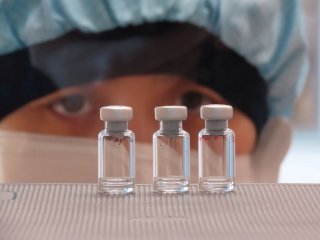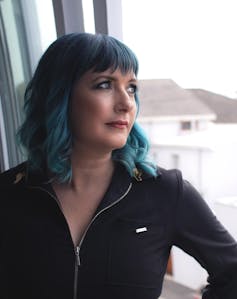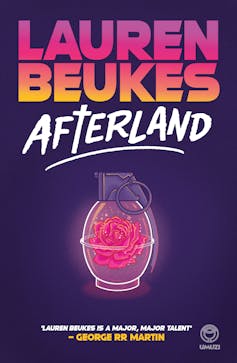What Would Happen If Most Men Around the World Died? This Book Has an Idea.
What the author of Afterland has to say.
Based in 2023, South African writer Lauren Beukes’ novel Afterland captures the devastating effects of a global pandemic.
A highly contagious virus, called HCV, has killed around four billion men. Society is in disrepair and, with no cure in sight, women are barred from procreation. The few males who have proven immune have become hot commodities for various agendas. And the odds are stacked against the protagonist Cole in her bid to return home to Johannesburg from America with her young son Miles – who possesses the HCV-resistant gene.
Cole has lost her husband and been forced into a quarantine facility so that the government can conduct experiments on Miles. She is relieved when her sister, Billie, shows up to help them break out. Yet, ever duplicitous, Billie has been enticed by the price of black market sperm.
Nedine Moonsamy interviewed Beukes about the book.
Nedine Moonsamy: How does it feel to have written this novel now that COVID-19 is here?
Lauren Beukes: The book isn’t about the pandemic, but the aftermath, and how Cole and Miles navigate this radically changed world in which boys are suddenly precious commodities. But it’s not a dystopia, it’s not a total apocalypse. I did want to model a society that still functions.
In the world of Afterland, most of the male population has died, leaving only 35-50 million men and boys on the whole planet. It was challenging and hella fun to explore what sectors would be hardest hit, especially in what the novel calls PMdI (Previously Male-dominated Industries), such as satellite technicians, undersea cable maintenance divers, truckers and pilots and engineers and mine workers and mechanics; and what measures the women in charge would have taken to manage that.
It mainly comes down to a whole lot of upskilling, but there are also some political shenanigans in the book: the US, for example, offers lucrative immigration deals to citizens from Egypt and Qatar and India where they have more women software engineers. The president of Colombia shuts down coffee exports until America legalises drugs because women don’t want to lose another single person to the violent narco trade.
There are religious groups that believe this is God’s punishment, and terrorist groups setting oil fields alight to bring about the true end times. But that’s all mostly background.
Cole and Miles do run into an anarchist community in Salt Lake City who are mobilising – hacking hotel cards to give people access to housing, for example. It’s been fascinating, and inspiring, to see South Africa’s own Community Action Networks reaching out across our huge divides to partner with under-resourced neighbourhoods.
Nedine Moonsamy: How did you approach the research for the book?
Lauren Beukes: I interviewed a lot of experts: I spoke to my friend Scott Hanselman about female coders, economist Hannes Grassegger about what this new imagined economy might look like, and scientist friends like Janine Scholefield explained viruses and keyholes and x-linked genetic variances to me. I asked Cape Town metro police officers on the ride-alongs I did, what would happen to the drugs and gangs if all the men disappeared: would they grind to a halt? “Are you kidding?” they said. They maintain it would continue in much the same way, maybe worse: “The most ruthless leader of the Americans was Mama American because she had more to prove.”
As Billie says in the novel, “Power is a fickle slut” – and yeah, absolutely, many of the old power structures are going to hold. Even in a world where 99% of the male population is dead, patriarchy is still a very comfortable pair of shoes and very easy to slip into.
It’s inspiring to see people talking about how we’re all going to reinvent the world post-COVID, go full socialism, bring in universal basic income, healthcare for all, proper minimum wage, income protection, continued bonds of support and care between wealthy neighbourhoods and disadvantaged ones. But capitalism is an old god, and it’s going to be very difficult to overthrow completely.
And of course there will be backlashes; epidemics are often terrible for women’s rights. Look at where women are the primary caregivers at cost to their careers, and vulnerable to violent partners. Plus they don’t go back to work and girls don’t go back to school in nearly the same numbers as men and boys.
I hope this has already been such a system shock that we will have no choice but to make significant changes to the way the world works now. But I’m afraid of what the cost to us is going to be.
Nedine Moonsamy: I can see that you steered away from a radical feminist novel in order to tell a story about the best version of familial love. From this angle, the novel seems to converse with Cormac McCarthy’s The Road where father and son travel through post-apocalyptic America to get to the coast. In Afterland the journey has a more optimistic spin. Were you attempting to rework this “great American novel” in some way?
Lauren Beukes: It depends on what you mean by radical. I didn’t want to tell a story that was all about the world, or the characters changing it, à la Harry Potter or Children of Men, but rather about the ordinary people caught up in that world. The Road was definitely a reference point, and again, something I was writing in conversation with (like The Handmaid’s Tale). I hated the ending of The Road. (Spoilers!) As a parent, I would never, ever let my kid go out into a world full of cannibals and rapists on their own. What kind of hope is that? It was blind luck that the next people he stumbled across were good.
From the feminist perspective, there were two ideas I wanted to play with: flipping the narrative, where suddenly Miles’s bodily autonomy and agency are under threat because people are treating him as a commodity, a reproductive resource, a sex object, a matter of “future security”. And exploring the idea of how a world of women is not necessarily going to be a kinder, gentler, friendship-bracelet-and-communal-gardens kinda place, where we can all go walking at night on our own and the country’s national women’s football team Banyana Banyana gets to play the huge stadiums.
I’m not big on the binary idea of masculine versus feminine, and I wanted to interrogate that. A world of women is a world of people, still, with full human capacity for good or evil. Because women are just as capable of being power-hungry, violent, self-interested, abusive and evil as men can be, especially when we’re still living through the same society, but maybe in different ways.
Likewise, men are just as capable of being compassionate, nurturing, primary caregivers – and making friendship bracelets.
To buy a copy of Afterland visit Penguin Random House over here.
![]()
Nedine Moonsamy, Senior Lecturer, University of Pretoria
This article is republished from The Conversation under a Creative Commons license. Read the original article.
Image: Reuters



